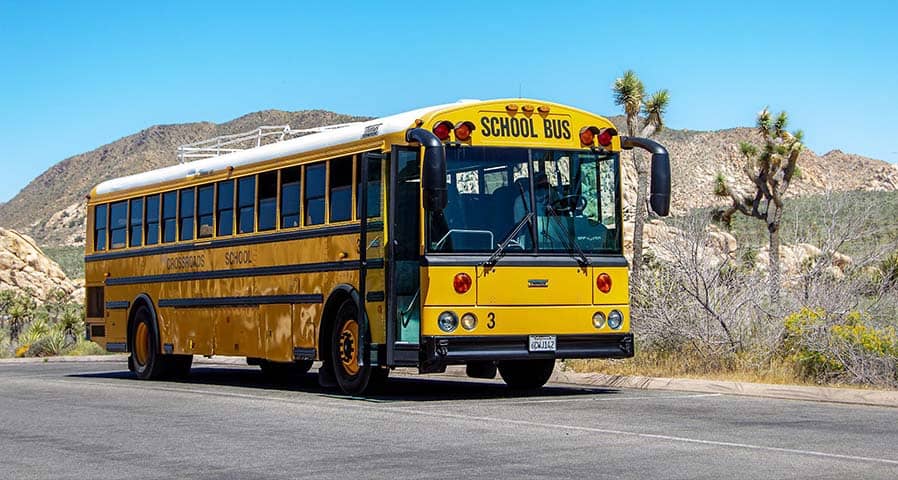Students are back in school after the pandemic and more of them are getting there on electric buses. EV school buses help improve air quality by reducing carbon emissions, helping to improve the health of the community. Electric school buses also save the district money on fuel costs. Which is a major plus in the current market.
With over half of students in grades K-12 riding the bus to school, it’s time to take a look at the potential advantages of electric buses.
The Benefits of Electric School Buses
Here’s a look at the benefits of using EV buses, along with some places that have successfully implemented the vehicles.
Improved Air Quality
Multiple studies show vehicle exhaust contributes to asthma in millions of children. Fossil fuels emit particulates that can exacerbate respiratory conditions in school-age children. Even with the potential health issues linked to the toxic and possibly carcinogenic chemicals in diesel exhaust, the majority of school districts still depend on fossil fuels.
Fortunately, there is a way to reduce these risks in transporting students to and from school. Transitioning to electric school buses can not only improve children’s health but also the overall community.
An EV Bus is Cheaper to Operate
EV school buses are cheaper to operate in every aspect, compare to compressed natural gas (CNG) and diesel vehicles.
One study mentions that EV buses can reduce operating costs by up to $50,000 per school year. An electrical vehicle manufacturer points out that maintenance for EV school buses is around 60% lower than standard fleet vehicles.
Maintenance is also minimal with electric school buses. Districts don’t need to set aside funds for air filters, oil changes, and smog inspections. You also don’t need to worry about transmission expenses, along with coil and spark plug replacement.
The funds you save with electric buses can be used to help support other school programs.
Electric school buses are pricier than fossil-fueled powered vehicles, but districts can take advantage of incentives to help offset costs. California’s Hybrid and Zero-Emission Truck and Bus Voucher Incentive Project (HVIP) provides districts with up to $235,000 for the purchase of electric school buses. Other states offering similar incentive programs include Massachusetts, New York, Michigan, and Washington.
“Calculations of return on investment should include the total societal cost for the life cycle of an electric bus versus a diesel bus.” — USPIRG
Save on Infrastructure Costs
School buses have set, relatively short routes and plenty of downtime between the morning and afternoon runs.
Using a mix of AC and DC chargers, districts can keep installation costs low. Using smart operating software to power the chargers can regulate charging to off-peak hours. It allows you to keep the electric school buses fully charged while also reducing energy usage costs.
Improved School Bus Driver Experience
Most school districts are having problems hiring enough bus drivers. Transitioning to a fleet of electric school buses can help districts attract talent. While a diesel-powered school bus is noisy and produces pollution, an EV bus is quiet and emission-free.
“Range is a consideration, but we charge for a few hours after each route. The driver loves how easy it is to recharge, and there’s no chance of spillage like [with] diesel or gasoline.” — Brad Redmond, West Fargo Public Schools’ transportation director.
Join Other Future Thinking School Districts
A study from 2020 found that in districts where EV school buses are tested, the overwhelming opinion on the vehicles’ performance is positive. The electric buses tackled a range of terrain and climate conditions and produced significant savings.
The Twin Rivers Unified School District Transportation Department in Sacramento, California has reduced fueling costs by 80% after switching to electric school buses.
Massachusetts is also electrifying its school buses, starting back in 2016. Vermont, North Dakota, and other states are also starting their own programs encouraging schools to electrify their transportation fleets.
Electrification of School Buses is the Future
New York, Seattle, and California are just a few places that are pledging to transition to an all-electric school bus fleet. By 2045, over 33% of school buses will be powered by electricity.
When your district is ready to start talking about electric school buses and installing EV chargers, we are here to help every step of the way, from electrical upgrades and infrastructure to the installation of your EV chargers.
To speak with an Apogee Charging Solutions EV charger specialist, call 484-816-2076, email [email protected], or you can schedule a call that fits your needs by clicking the button below.








0 Comments